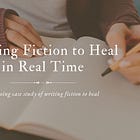If you’re new to The Rebel MFA Way, welcome! This is an essay in my ongoing “Writing Fiction to Heal in Real Time” series where I deep-dive into my writing fiction to heal method as field work and a case study. To begin, I will be working through my story, The Archive, which you can find more information on here.
[NOTE: Your email provider may truncate this essay, be sure to click on “keep reading” to read the entire piece.]
This Friday marks 12 weeks. 16,893 Words. 8 Journal Entries. 4 reports by AI-2052-Ω.
Are we having fun, yet?
I am. I can’t even begin to tell you how much this experiment has already changed me—not just in the way of healing, but in surprising ways I didn’t see coming. (More on that soon.)
Twelve weeks feels like the perfect moment to pause and reflect on how the experiment is unfolding—which is why I’ll be taking a two-week break to do just that. And, if you read my essay, The Emotional and Vulnerability Hangover — you’ll also get why having a break is necessary for my emotional well-being. I’m also learning that becoming “collapse-aware1” is more emotional and exhausting than I ever thought possible.
During my break (the next two weeks), I’ll be letting my imagination play in the shadows, indulging in joy, taking naps without shame, watching stories that spark something feral. I’ll be giving The Archive space to breathe so it can whisper back. I’ll be rabbit-holing2 and day dreaming. Making fictional connections and doing absolutely nothing.
All the best things to refuel and recharge for another 12 weeks of The Archive.
While you wait for the next installment of entries from The Archive, I want to recommend a few practical resources I’ve been obsessed with and are helping me with writing this story. [Have you caught up on all the published entries? If not, go do it right meow!]
First up is someone who inspired me to move forward with The Archive by paving the way on Substack… Sarah Wilson from This is Precious wrote and serialized The Collapse Book: A Journey of Human Homecoming and it has been INCREDIBLE to follow. While The Archive is fiction (mostly), Sarah’s book is not and it has really helped me intellectually bridge the gap between real life and my fiction. She also has done a brilliant job of taking seemingly unrelated topics/concepts and brought them into the conversation of collapse like fairytales, myths, pop culture, etc.
As I’ve mentioned in a previous essay, most of my knowledge of collapse and apocalypse comes from movies, shows, or books. And I have to reverse course here and say, I was wrong. In an essay where I answered questions from readers, I said that I wasn’t interested in the reasons why a society collapses and I’m taking that back. I’m actually incredibly interested now. I can’t stop thinking about questions like: How did we get here? What does it actually mean to be in a collapse? And for this, I’ve found the podcast Breaking Down: Collapse to be one of the best resources on the interwebs. It may not be the most scientific or the most intellectual… but in my opinion, it’s the most “understandable.” Kory and Kellan from the podcast break things down in a way that makes sense to those of us who are going into collapse awareness pretty blind. The first seven or eight episodes should be mandatory listening, honestly. Even if that’s the only thing you listened to (because the podcast has been going since 2020!) you would learn enough to know that as a society… we are in deep, deep shit.
Reddit can be a magical (and dangerous) place. But I have found that the subreddit r/collapse has been a pretty solid resource to turn to for information and to gauge what the “collapse-aware” are feeling about the things going on in the world. My favorite threads are the “Last Week in Collapse roundups [these are also available on Substack].
“Last Week in Collapse compiles weekly news about our worsening environmental situation at several levels; challenges and developments in global health; particular social & economic events and processes; and war in all its shapes and sizes (and there are many). The end result is a weekly cross-section of the Collapse of Civilization—ours, to be specific.”3While most of this list is about collapse, the Wilderness Long-Term Survival Guide by Nicole Apelian, Ph.D. resource is an example of a survivalist reference book Ari would find in her library. Personally, I’ve placed my physical copy in my “Bug-Out” bag, but it’s also been useful for planning how Ari might learn or utilize the wilderness in The Archive.
That’s it for this week, friends! I’ll see you in two weeks <3
Don’t want to get these email notifications? Or maybe you want to make sure you get these notifications? Manage your notification settings here:
To read the backstory to why I’m writing this series:
To read the backstory on why I’m serializing “The Archive,”:
This term and all it encompasses is something I’ll be talking more about in a future essay because it’s BIG and it’s A LOT.
Definition: To intentionally go down rabbit holes. I don’t think this is a real word/verb but I’m making it a thing, ok?
https://lastweekincollapse.substack.com/about








